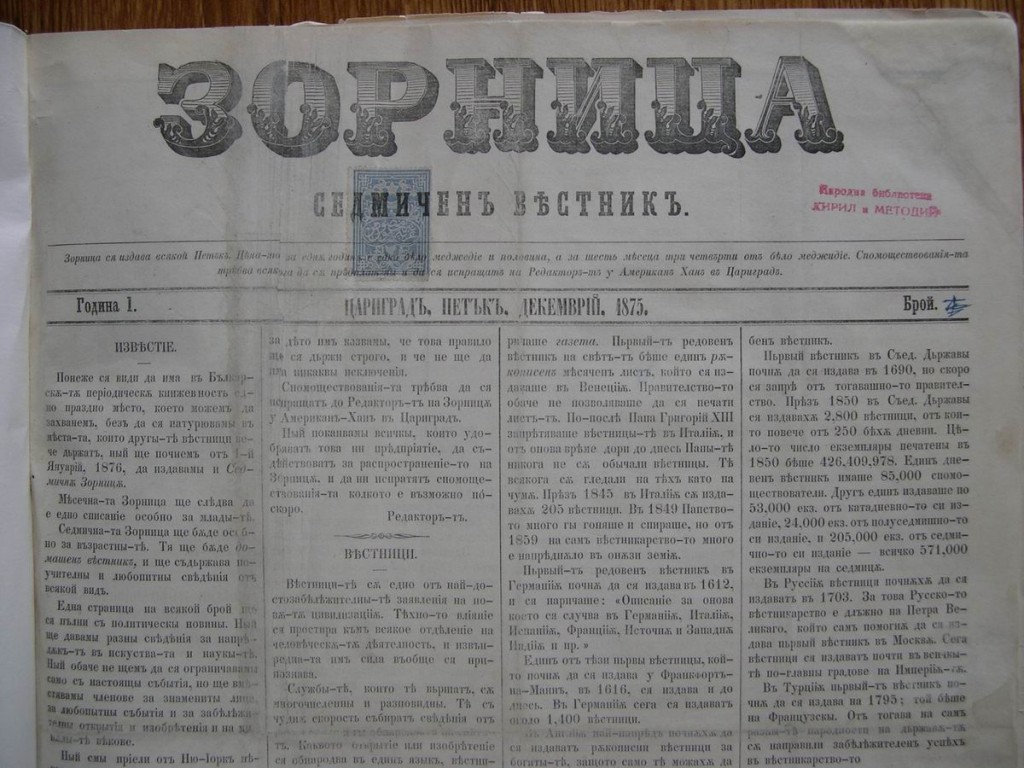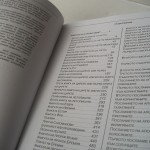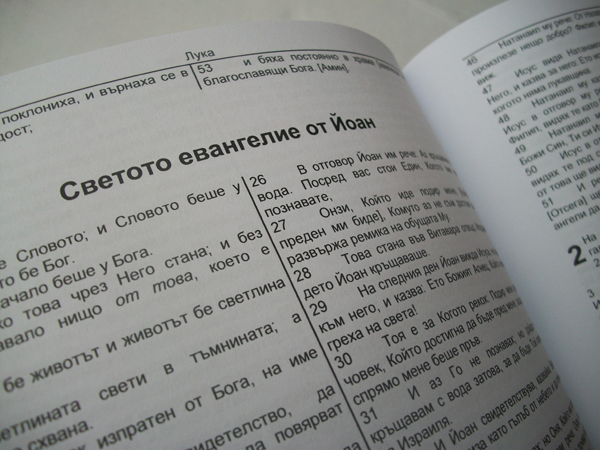
Вестник „Зорница” | Zornitsa.net
След успешно популяризиране като образователно списание, ЗОРНИЦА започва да излиза и като първия български седмичен вестник през 1875г. Пилотният брой е отпечатан от протестантските мисионери в Цариград последния петък на месец декември.
Вестник Зорница е най-старият седмичник и протестантско издание на български език – истинската Зорница на българския протестантизъм. Присъства във всеки стадий от новата българска история, като авангард на свободна мисъл и правото на вяра. За съжаление, днес съществуват малко на брой, предимно частни пълни колекции на Зорница, което възпрепятства контакта на българския читател и изследовател до най-старателно записваната, изконно българска, част от протестантската история.
През последните пет години, Институтът за българска протестантска история и екипът на Bibliata.com, заедно с множество пастори, църкви и библиотеки в и извън България, работи по Инициативата ЗОРНИЦА. Този проект цели събиране и представяне в дигитален формат най-старите броеве на Зорница (в двете му форми на списание и вестник). Уебстраницата на в. Зорница се намира на адрес: www.zornitsa.net
 Когато вестник „Зорница“ се появява в Цариград през 1864 той не е първият вестник, издаван на български език в столицата на Османската империя. През Възрожденския период в Цариград излизат около 20 вестника и 9 списания. От 1862 Високата порта открива Департамент по печата, който има за цел да цензурира пресата. Българските вестници, издавани в Цариград, са ограничени в либералното си съдържание поради тези тенденции, докато вестниците, издавани на север от Дунав, се отличават с по-радикална идеология. Цензурата над българския печат се извършва от етнически българи или османски чиновници. Такива са Панов, Манчов, Генович, Ваклидов и Драган Цанков.
Когато вестник „Зорница“ се появява в Цариград през 1864 той не е първият вестник, издаван на български език в столицата на Османската империя. През Възрожденския период в Цариград излизат около 20 вестника и 9 списания. От 1862 Високата порта открива Департамент по печата, който има за цел да цензурира пресата. Българските вестници, издавани в Цариград, са ограничени в либералното си съдържание поради тези тенденции, докато вестниците, издавани на север от Дунав, се отличават с по-радикална идеология. Цензурата над българския печат се извършва от етнически българи или османски чиновници. Такива са Панов, Манчов, Генович, Ваклидов и Драган Цанков.
Тъй като „Зорница“ се радва на западното покровителство, би следвало отношението от страна на държавната цензура към вестника да е по-благосклонно. Но на практика това не е така. Алберт Лонг счита, че спирането на вестника през 1865 става под йезуитско влияние. Макар че липсват достатъчно данни, възможно е именно Драган Цанков да е наложил цензурното спиране, поради католическото си влияние през този период. Американският мисионерски борд също отбелязва, че основен противник на работата му в Цариград са именно българските йезуити.
Поради голямата си популярност и социалната си насока, „Зорница“ придобива и заема изключително важна позиция в българската историография. Негативната коннотация на православни апологети, заклеймяващи „чуждата пропаганда“ на протестантите в българските земи по онова време, подминава вестника. В годините след Освобождението „Зорница“ е разглеждан от историците като вестникът, оказал най-силно влияние в развитието на българите през Възраждането. В студиите си за протестантската история Стоянов, Христов, Петков, Илков, Мутафова и Пантев споменават заслугите на д-р Алберт Лонг. Георги Генов разкри наскоро и ролята на д-р Елиас Ригс като възможен пръв инициатор на в-к „Зорница“. След преглед на личния дневник на Ригс, който понастоящем е забулен в тайна, Генов цитира, че именно Ригс стартира вестника в отсъствието на Лонг.
Проф. Барбара Рийвс-Елингтън, в своята хабилитация, прави основен преглед на мотивите на Лонг за започването на „Зорница“. Нейното мнение е базирано на обстойния преглед на архивите на Лонг в Америка. Тя също отбелязва взаимния труд на Ригс и Лонг в редактирането на вестника, както и значението на феминистката ориентация на „Зорница” под влиянието на Марта Ригс. В дисертацията си Рийвс-Елингтън разяснява началното действие на методисткото общество в България и динамиката около преместването на Лонг в Цариград. Трябва да се отбележи и публикуваното изследване на българските протестантски издания от Росица Ангелова, преподавател в Шуменския университет (БХСС, 2003).
Мисионерите от Американския борд и Методисткото общество установяват първите си станции сред българите през 1857-58. Първите мисионери тук са д-р Алберт Лонг, Уесли Претимен и Фредерик Флокен. По настояване на Обществото, Претимен се премества в Шумен, където скоро престига и Флокен.
След началния успех, Лонг се премества в Търново, но успехът му там е ограничен. Запознаването му със Славейков и Михайловски са сред основните му мотиви, да търси форма за благовестие и просвета, която по-масово да обхване българското население. Разбирайки тясната връзка между националното самосъзнание на българите и българския език, още през 1857 пише: „взимайки предвид опита (на българите) да възстановят езика си и да поведат образователната си система и литература, трябва да се насочат в правилната насока, за да дойдат и до Христа“.
След 1960 д-р Алберт Лонг търси разрешение от турските власти за отваряне на печатница в Търново, което му е отказано. Лонг подава молбата за преместването си в Цариград, като се аргументира с многобройното българско присъствие и че всяка солидна мисия има нужда от представителство в столицата. По това време между 60-80 000 етнически българи живеят в Цариград.
През 1863 Лонг се премества в Цариград, където помага на Ригс в подготовката за изданието на Българската Библия. Там Лонг превежда и отпечатва религиозни брушури на различни теми, като същевременно подготвя и по издаването на „Зорница“. Първият брой на „Зорница“ е отпечатан официално през 1864. Главен редактор е Алберт Лонг, въпреки че през 1865 тази отговорност поема Елиас Ригс.
Новият вестник излиза всеки месец на български език в печатницата на А. Минасов и съдържа осем четвъртини страници. Форматът на „Зорница“ е моделиран по западните религиозни списания за младежи. Главната цел на Лонг е да достигне подрастващото поколение, което след Кримската война и Тансимат-реформите надминава по образованост родителите си и страни от фанариотски влечения.
Друга цел е адресирането на определени теми във вестника до нуждите на жените. По това време не съществува друг вестник с такъв кръгозор. В тази си дейност д-р Лонг получава помощта на Марта Ригс, съпругата на д-р Елиас Ригс. Тя издава серия от статии под заглавито „Писма до майката“ с морално и религиозно съдържание. Идеята е, че майките имат неограничено влияние върху подрастващото поколение. На страниците на „Зорница“ се афишира и нуждата от образователни заведения за момичета. Цялостното влияние, което “Зорница” оказва върху българското общество по онова време върху промяната на социалното място на жената и отношението към нея, е неоценимо.
Съдържанието на „Зорница“ обхваща библейски истории, морални сказки, протестантски химни в превод на Ригс, природознание (Лонг преподава тази дисциплина впоследствие в Робърт Колеж), естествени науки, география с илюстрации, информация за американски институции и училища като модели от просперираща модерна нация, истории за успели хора, стигнали от бедност до праведно благосъстояние, както и биографии на бележити политически личности като Вашингтон, Франклин и др. В този си формат „Зорница“ излиза между 1864-1871, когато Алберт Лонг започва да преподава в Роберт Колеж.
От самото начало, „Зорница“ се посреща със съмнение от турските власти. След петия си брой „Зорница“ е спрян за периода юни 1864 до май 1865. Лонг смята, че тази цензурна забрана е наложена от българин, завършил йезуитски колеж. Налага се секретарят на Американското посолство да пледира пред Великия везир Али Паша за подновяването на изданието. В разговора, предаден от д-р Едуард Хакел години по-късно, везирът обвинява „Зорница“ в републиканизъм, правейки асоциаця между протестантството и републиканската идеология.
Допълнително обстоятелство е фактът, че в Цариград през юли 1864 се провежда правителствена офанзива срещу протестантската активност. Покръстилите се мюсюлмани са арестувани, сградите на Американския борд, Британското библейско дружество и Американското библейско дружество са запечатани.
Отпечатването на вестника е подновено през 1865. „Зорница“ търси широка публика, като различията между протестантство и православие се разглеждат по деликатен и ненатрапчив начин. Зареди това си качество, вестникът е търсен от православни интелектуалци и свещеници. Като цяло, месечното издание на „Зорница“ не е информационен вестник, а по-скоро образователно пособие. Цената му от четири гроша е преднамерено ниска и достъпна за читателите, докато други български вестници струват 40-60 гроша. На много места вестникът е използван вместо скъпите учебни помагала.
Вестникът се отпечатва в Цариград, където можело да се изпрати дописка за абонамент, а после чрез миграционните работници и кираджии се отправял към всички краища на Добруджа, Тракия и Македония. Допълнително с вестника се снабдявали чрез мисионерските станции и под-станции, доставян от служителите на Американското и Британското библейски дружества, обикалящи българските етнически територии. Така „Зорница“ достига внушителен за времето си тираж, надминавайки по брой издания и абонати всички останали български издания.
Вестник “Зорница” – живата българска история и култура
Годишнините на три събития, чествани тази пролет и лято в България, разкриват изключителната роля на българския протестантизъм в историята и културата на националната ни държава. Хронологически на първо място това е 130-годишнината от изданието на вестник „Зорница”. Започнала като месечно списание през 1864г., превръщането на „Зорница” от 2 януари 1876г. в седмичен вестник с паралелен месечник я прави най-значимата българска медия през 19-ти век. От Славейков, през Вазов и Яворов, до Симеон Радев и Иван Шишманов – българските възрожденски и следосвобожденски интелектуалци и общественици са единодушни в оценките си за високото качество, национално-консолидационния и прогресивен характер, и силното медийно влияние на вестник “Зорница” в българското общество.
На второ място е 130-годишнина от Априлското въстание, истината за което се разпространява от страниците на „Зорница”. Това, заедно с усилията на протестантите у нас да насочат вниманието на западните медии и политически кръгове към България, допринасят изключително за смяната на международното отношение към турската политика в българските територии на Османската империя. И, разбира се, честваната през месец юни 135-годишнина от първото издание на Библията на съвременен български език – феноменалният от лингвистична гледна точка превод на д-р Алберт Лонг, д-р Илайъс Ригс, Петко Р. Славейков и Хр. Сечанов.
Вестник „Зорница“
Незабелязана сякаш от българските медии премина организираната на 30 май в Националната библиотека „Св. Св. Кирил и Методий“ Кръгла маса по случай 130-годишнината от първия брой на в-к „Зорница“ – най-значителната българска медия през 19-ти век, чийто контекстуален и издателски стандарт полага основата на съвременните български медии.
В дискусията участваxa проф. д.ф.н. Боряна Христова, доц. д-р Веселин Методиев, ст.н.с. д.ф.н. Георги Василев, проф. д.т.н. Димитър Киров, ст.н.с. д-р Елена Хаджиниколова, проф. д.ф.н. Елка Константинова, проф. д.и.н. Иван Илчев, ст.н.с. д-р Йордан Василев, доц. д-р Пламен Митев, доц. д-р Румен Генов, проф. Андрей Пантев д. и. н, Стоян Райчевски и пастoр д-р Христо Куличев – гл. редактор на днешната „Зорница”. Гости от Македония бяха Мойсей Трайковски, брат на покойния македонски президент Борис Трайковски, и Михаил Цеков, председател на Съюза на евангелските методистки църкви в Македония.
Високо оценена е заслугата на „Зорница“ за българското обществено, национално и медийно развитие в пред- и следосвобожденския период на историята ни. Висока оценка се дава и на историческата и културна роля на българския протестантизъм като цяло. Мястото, което българските протестанти имат в обществените, политически и икономически процеси в развитието на новата българска държава, за съжаление, е унищожено целенасочено от пропагандата на комунистическата диктатура след 1944г.
Резултат от систематичните усилия в тази насока по време на тоталитарната система и в ранните години на посткомунизма е фалшифицирането историята и образа на протестантските църкви. Християнските общности се изолират и обществото се настройва срещу българските протестанти в социалистическото общество, които са обявени за „прозападен, вражески, чужд на нацията фактор“. Фактът, че това клеймо е само един атрибут в артикулацията на тоталитарната система за манипулация на масата, се доказва веднага от един задълбочен поглед в българската история преди 1944г. Но постигнатите от тоталитарната система вмешателство и контрол над религиозната сфера довеждат до разделение на частите на Църквата и настройване на трите църковни деноминации и християни едни срещу други. Поддържането на половин вековен антагонизъм между православни християни, протестанти и католици по време на диктатурния период в България и днес все още дава своите горчиви плодове в междуцърковните, обществените и междучовешките отношения.
Когато списание „Зорница“ се появява в Цариград през 1864г., то не е първото издание на български език в столицата на Османската империя. През Възрожденския период в Цариград излизат около 20 вестника и 9 списания. От 1862г. от Високата порта е открит Департамент по печата, който има за цел да цензурира пресата – и българските вестници, издавани в Цариград, са ограничени, поради либералното си съдържание, от тези тенденции, докато вестниците, издавани на север от Дунав, се отличават с по-радикална идеология. Цензурата над българския печат се извършва от етнически българи османски чиновници.
Но поради голямата си популярност и широка социална насока, „Зорница“ заема изключително важна позиция в българската историография. В годините след Освобождението „Зорница“ е разглеждан от историците като вестникът, оказал най-силно влияние върху развитието на българите през Възраждането. Заслугата за качеството на списанието и вестника е на американските мисионери д-р Алберт Лонг и д-р Илайъс Ригс, за когото се предполага, че е един от първите инициатор на в-к „Зорница“.
Трудът на двамата при редактирането, издаването и разпространението на вестника в условията на Османската империя разкрива истинската си величина и стойност, когато стане ясно, че са обхванати всички земи, населявани от българи – от Македония до Бесарабия и от Беломорска Тракия до Западните покрайнини. Изключителна за времето си е и прогресивната ориентация на „Зорница” относно образа и ролята на жената в българското общество под влиянието на редакторката Марта Ригс. Паралелно на изданието, протестантското общество в България и динамиката на мисионерската работа изискват силите на тримата и сътрудниците им. Те обичат българския народ и се обричат на националната му кауза, изучават и говорят езика му, стават част от неговата съдба.
Макар започнали работа в началото на 19-ти век на територията на Османската империя, мисионерите от Американския борд и Методисткото общество установяват първите си станции окончателно през 1857г. Четиридесет години са необходими за прокарване на този мисионерски коридор на Балканите сред българите. Първите мисионери тук са д-р Алберт Лонг, Уесли Претимен и Фредерик Флокен. Те намират вече започнали или копнеещи за реформи на църковния живот български общности.
По настояване на Методисткото общество, Претимен се премества в Шумен, където скоро престига и Флокен. След началния си успех, Алберт Лонг се премества в Търново. Запознанството със Славейков и Михайловски е сред основните му мотиви, да търси форма за благовестие и просвета, която да обхване българското население. Лонг разбира много добре тясната връзка между националното самосъзнание на българите и българския език.
През 1860г. д-р Лонг търси разрешение от турските власти за отваряне на печатница в Търново, което му е отказано. Той не се отчайва, а се мотивира да подаде молбата за преместването си в Цариград, като се аргументира с многобройното българско присъствие и че всяка солидна мисия има нужда от представителство в столицата. По това време между 60-80 000 етнически българи живеят в Цариград. През 1863г. е преместен в Цариград, където започва да помага на намиращия се там вече д-р Ригс в подготовката за изданието на Българската Библия. Там Лонг превежда на български и отпечатва религиозни брушури на различни теми, като същевременно подготвя и издаването на „Зорница“. Първият брой на списание „Зорница“ е отпечатан официално през 1864г. Главен редактор е Алберт Лонг, въпреки че през 1865г. тази отговорност поема Илайъс Ригс.
Новият вестник излиза всеки месец на български език в печатницата на А. Минасов. Форматът на „Зорница“ е моделиран по западните религиозни списания за младежи. Главната цел на Лонг е да достигне подрастващото поколение, което след Кримската война и Тансимат-реформите надминава по образованост родителите си, страни от фанариотски влечения, търси националната си идентичност и вижда необходимостта от реформи в православната църква, които да я отдалечат от елинизацията й.
Друга цел е адресирането на определени теми във вестника до нуждите на жените. По това време не съществува друг вестник с такава насоченост. За тази дейност д-р Лонг получава помощта на Марта Ригс, съпругата на д-р Илайъс Ригс. Тя издава серия от статии под заглавито „Писма до майката“ с морално и религиозно съдържание. Идеята е, че майките имат неограничено влияние върху подрастващото поколение и те притежават изключителен потенциал. На страниците на „Зорница“ се афишира и нуждата от образователни заведения за момичета. Цялостното влияние, което “Зорница” оказва върху българското общество по онова време върху промяната на социалното място на жената и отношението към нея, е неоценимо.
Съдържанието на „Зорница“ обхваща библейски истории, морални сказки, протестантски химни в превод на Ригс, природознание (Лонг преподава тази дисциплина впоследствие в прочутия Робърт Колеж, в който следват не един и двама български общественици и политици), естествени науки, география с илюстрации, информация за американски институции и училища като модели на просперираща модерна демократична държава, автентични истории за успели хора, стигнали от бедност до праведно благосъстояние, както и биографии на бележити политически личности като Вашингтон, Франклин, Джефърсън и др. В този си формат „Зорница“ излиза между 1864-1871г., когато Алберт Лонг започва да преподава в Роберт Колеж.
От самото начало, „Зорница“ се посреща със съмнение от турските власти. След петия си брой „Зорница“ е спряна за периода юни 1864г. до май 1865г. Лонг смята, че тази цензурна забрана е предизвикана от българин йезуит. Налага се секретарят на Американското посолство да пледира пред Великия везир Али Паша за подновяването на изданието. В разговора, предаден от мисионера д-р Едуард Хакел години по-късно, везирът обвинява списание „Зорница“ в републиканизъм, правейки асоциация между протестантството и републиканската идея на САЩ.
Допълнително обстоятелство е фактът, че в Цариград през юли 1864г. се провежда правителствена офанзива срещу протестантската активност. Покръстилите се в християнството мюсюлмани са арестувани, а сградите на Американския борд, Британското библейско дружество и Американското библейско дружество са запечатани. Отпечатването на списанието е подновено през 1865г.
„Зорница“ търси широка публика, като различията между протестантство и православие се разглеждат по деликатен и ненатрапчив начин. Зареди това си качество, вестникът е търсен от православни интелектуалци и свещеници. Като цяло, месечното издание на „Зорница“ не е информационен вестник, а по-скоро образователно пособие. Цената му от четири гроша е преднамерено ниска и достъпна за читателите, докато други български вестници струват 40-60 гроша. На много места вестникът е използван вместо скъпите учебни помагала.
Списанието се отпечатва в Цариград, където било възможно да се изпрати дописка за абонамент, а после чрез сътрудници-куриери или наети за такива дюлгери и кираджии се отправял към всички краища на Добруджа, Тракия и Македония. Допълнително със списанието се снабдявали чрез мисионерските станции и под-станции, доставяно от служителите на Американското и Британското библейски дружества, обикалящи българските етнически територии. Така „Зорница“ достига внушителен за времето си тираж, надминавайки по брой издания и абонати всички останали български издания.
Вестник „Зорница“ и отразяването на Априлското въстание
През 1872г. на Второто годишно събрание на Евангелската Мисия за Европейска Турция делегатите натоварват д-р Илайъс Ригс със задължението да подпомогнe по-нататъшното развитие на вестника. Успешно е приключило отпечатването на българския протестантски превод на Библията и “Зорница” излиза на преден план като основна цел в издателските планове на мисионерите. Форматът е увеличен, най-важната промяна обаче се явява превръщането на изданието в седмично.
Седмичната “Зорница” излиза всъщност за първи път през декември 1875г., макар официално да се води датата 2 януари 1876г., като успоредно с нея продължава да излиза и месечно издание на вестника, стартирало 1864г., което сега е ориентирано специално към читателите в юношеска възраст. Главен редактор в този период е Теодор Баингтън, но спомените на съвременниците свидетелстват, че д-р Илайъс Ригс има ключовата роля както в подготовката на много от статиите (д-р Ригс е автор на много неподписани публикации в “Зорница”), така и в цялостната редакционна политика.
Промяната в издателската политика на “Зорница” се извършва непосредствено преди едно от най-драматичните събития в Българското Възраждане – Априлското въстание. Към момента на избухване на Априлското въстание “Зорница” е най-разпространеният български вестник, покривaщ практически всички територии, на които се простира българският етнос, като същевременно си е завоювал завиден авторитет сред българската общественост.
Позицията на вестника по време на трагичните събития от 1876г. показва, че това не е случайно явление, тъй като евангелските християни, пишещи вестника, са намерили верния начин не само да работят като богослови и публицисти, но същевременно да служат и помагат на българския народ за националната му кауза.
Мнозина обективни изследователи еднозначно са признали на протестантските мисионери, българските им сътрудници и изданието заслугата за възбуждане на международното внимание и обществена съвест към българския национален въпрос. От една страна издателите на “Зорница” предават всяка получена информация за ужасите, свързани с потушаването на въстанието, директно на британските и американски правителствени организации и лица, както и на влиятелни издания в тези страни. От друга, самите мисионери смело и усърдно обикалят опустошените региони, помагат на пострадалите, като са и основните съмишленици на разследванията, предизвикани и учредени от британския политик Гладстон. Още по-впечатляващо е смелото и съпричастно отразяване на въстанието на страниците на самия вестник.
“Зорница” се превръща де факто в единствения писмен източник на информация за българския народ в неговите най-отдалечени земи за случващото се във въстаналите територии. Чрез седмичника българският народ по всички краища на поробените ни територии съпреживява ужаса и трагедията на Априлското въстание – така, макар бойните действия да обхващат ограничени области, целият български народ е информиран за събитията. По този начин “Зорница” дава своя своеобразен принос, въстанието от април-юни 1876г. да се превърне в общонародна драма и общо преживяване за цялата българска нация.
Още с първите дни на въстанието “Зорница” съобщава на населението за мобилизацията на турски войски и тяхното придвижване към Пловдив и Пазарджик. В бр. 18 от 30 април 1876г., в статия със заглавие “Смущения в България” читателите разбират за въстанието в Панагюрско. В следващия брой от 7 май е публикувана телеграма на Хафуз паша за погрома над въстаналата Стрелча. В същия брой подробно е описано превземането и разрушаването от турските войски на въстаналото Панагюрище, има подробна информация за арестите в Пазарджишко и Одринско. Отделно е разказано за арестите на български православни свещеници, включително и за епископ от Пловдив. В броя от 14 май 1876г. читателите са информирани за черкезките набези в Тревненско, Софийско, Севлиевско и движението им. Извънредно е отразено опожаряването на 118 села в Пловдивския санджак.
Издателите на “Зорница” подават информация и подсказват на читателите за напрежението, което въстанието поражда във Високата порта, като ги информира и за изпращането на правителствени анкетьори. “Зорница” описва геройствата на българските въстаници, изправили се с черешови топчета срещу оръдията “Круп” на Османската армия.
В броя си от 21 май 1876г. “Зорница” съобщава подробно за въстаническите действия в Търновско и тормоза над българите в Битолско. Издателите на “Зорница” показват изключителна информираност, съобщавайки за въстаническите чети в Жеравна и Медвен, за башибозушките грабежи в Самоковско. Авторите на протестантското издание стават все по-смели, наричайки пряко, въпреки заплахите към вестника, „терор” – действията на башибозука в Шуменско.
Издателите на “Зорница” окуражават българските читатели, информирайки за пробуждането на общественото мнение в Западния свят. Публикуван е първият от поредица материали – изказването на лорд Стретфорд за необходимостта от “радикална промяна в Османската империя”. “Зорница” е и тази, която информира читателите си за пристигането на четата на Христо Ботев, като посочва състава й от 175 въстаници и отразява пристигането й на българския бряг с парахода “Радецки”, както и за смъртта на Ботев. Публикувано е и известие за смъртта на въстаническия ръководител Георги Бенковски.
В броя си от 11 юни “Зорница” публикува дословно текста на “Прокламация на българските въстаници към мюсюлманите”, където изрично се показва, че действията на въстаналите българи са насочени срещу османския деспотичен режим, а мюсюлманското население е наречено събирателно “братя”. По този начин протестантските мисионери и издатели на “Зорница” свидетелстват за толерантността на въстаналите българи и изграждат нравствения облик на тяхната кауза пред западните политически кръгове. Издателите на “Зорница” са наясно, че паралелно с въстаническите битки, тече решаваща битка за световното обществено мнение. Те правят всичко възможно да подпомага българската кауза на международната сцена.
„Зорница“ и отразяването на Априлското въстание 1876
През 1872 г. на Второто годишно събрание на Мисията за Европейска Турция делегатите натоварват д-р Ригс със задължението да подпомогнe по-нататъшното развитие на вестника. Успешно е приключило отпечатването на българския протестантски превод на Библията и “Зорница” излиза на преден план като основна цел в издателските планове на мисионерите.
След възстановяване издаването на вестника през 1874 г. са направени някои промени – форматът е увеличен от четвърт на половин фолио. Най-важната промяна обаче се явява превръщането на изданието в седмично. Седмичната “Зорница” излиза за първи път през декември 1875 г., като успоредно с нея продължава да излиза и месечно издание на вестника, което е ориентирано специално към читателите в юношеска възраст. Главен редактор в този период е Теодор Баингтън, но спомените на съвременниците свидетелстват, че д-р Ригс има ключова роля – както в подготовката на много от статиите (д-р Ригс е автор на много неподписани публикации в “Зорница”), така и в редакционната политика.
Промяната в издателската политика на “Зорница” се извършва непосредствено преди едно от най-драматичните събития в Българското Възраждане – Априлското въстание. Към момента на въстанието “Зорница” е най-разпространеният български вестник, покривaщ практически всички територии, на които се простира българският етнос, като същевременно си е завоювал завиден авторитет сред българската общественост. Позицията на вестника по време на трагичните събития от 1876 г. показва, че това не е случайно явление, че хората, пишещи вестника, са намерили верния начин да благовестват и същевременно да служат и помагат на българския народ.
Мнозина обективни изследователи еднозначно са признали на протестантските мисионери и тяхното издание заслугата за събуждането на международното внимание и обществена съвест по българския въпрос. От една страна издателите на “Зорница” предават всяка получена информация за ужасите, свързани с потушаването на въстанието, директно на британските и американски правителствени организации и лица, както и на влиятелни издания в тези страни. От друга, самите мисионери смело и усърдно обикалят опустошените региони, като са и основните съмишленици на разследванията, предизвикани и учредени от британския политик Гладстон. Още по-впечатляващо е смелото и съпричастно отразяване на въстанието на страниците на самия вестник. “Зорница” се превръща в единствения писмен източник на информация за българския народ в неговите най-отдалечени земи за случващото се във въстаналите територии. Чрез “Зорница” българският народ съпреживява ужаса и трагедията на Априлското въстание – така, макар бойните действия да обхващат ограничени територии, целият български народ е информиран за случващото се. По този начин “Зорница” дава своя своеобразен принос, събитията от април-юни 1876 г. да се превърнат в общонародна драма и общо преживяване за цялата българска нация.
Още с първите дни на въстанието “Зорница” съобщава за мобилизация на турски войски и тяхното придвижване към Пловдив и Пазарджик. В бр. 18 от 30 април 1876 г., в статия със заглавие “Смущения в България” читателите получават информацията за въстанието в Панагюрско. В следващия брой от 7 май е публикувана телеграма на Хафуз паша за погрома над въстаналата Стрелча. В същия брой подробно е описано превземането от турските войски на въстаналото Панагюрище, има подробна информация за арестите в Пазарджишко и Одринско. Отделно е разказано за арестите на български свещеници, включително и за епископ от Пловдив.
В броя от 14 май читателите са информирани за черкезски грабежи в Тревненско, Софийско, Севлиевско. Извънредно е отразено опожаряването на 118 села в Пловдивския санджак. Издателите на “Зорница” подсказват на читателите за напрежението, което въстанието произвежда във Високата порта, информирайки ги за изпращането на правителствени анкетьори. “Зорница” разказва за черешовите топчета на въстаниците, изправили се срещу оръдията “Круп” на османската армия. В броя си от 21 май“ Зорница съобщава подробно за въстаническите действия в Търновско и тормоза над българите в Битолско. Издателите на “Зорница” показват изключителна информираност, съобщавайки за въстаническите чети в Жеравна и Медвен, както и за башибозушките грабежи в Самоковско. Авторите стават все по-смели, наричайки терор действията на башибозука в Шуменско. Издателите на “Зорница” окуражават българските читатели, информирайки за пробуждането на общественото мнение в западния свят. Публикуван е първият от поредицата материали – изказването на лорд Стретфорд за необходимостта от “радикална промяна в Османската империя”.
“Зорница” информира читателите си за пристигането на четата на Христо Ботев, като посочва състава й от 175 въстаника и отразява пристигането й на българския бряг с парахода “Радецки”. Публикувано е и известие за смъртта на въстаническия ръководител Георги Бенковски.
В броя си от 11 юни “Зорница” публикува дословно текста на “Прокламация на българските въстаници към мюсюлманите”, където изрично се показва, че действията на въстаналите българи са насочени срещу османския деспотичен режим, а мюсюлманското население е наречено събирателно “братя”. По този начин “Зорница” свидетелства за толерантността на въстаналите българи и изгражда нравствения облик на тяхната кауза. Издателите на “Зорница” са наясно, че, редом с въстаническите битки, тече решаваща битка за световното обществено мнение. И прави всичко възможно да подпомага българската кауза на международната сцена. Същевременно вестникът окуражава българите, че усилията и жертвите дават своите плодове навън – през юли е публикувана препечатка от британския “Икономист” с резултати от анкетата на д-р Уошбърн за българското въстание и остри критики срещу протурската политика на премиера Дизраели. В бр. 30 английският консул в Цариград Ф. Франсин е наречен “приятел на българите” и се разказва за неговата лична дипломатическа намеса, следствие на която са освободени 212 арестувани български въстаници от Одринския затвор. На 3 септември е публикувана информация за издадената от ръководителя на опозиционната Либерална партия в Англия Гладстон брошура “Българските ужаси и Източния въпрос”. В следващия брой е дадена информация за последвало обръщение на Гладстоун и Страдфорд към “съвестта на английското общество”. Освен това се публикува информация за създадените в множество английски градове комитети за събиране помощи за пострадалите българи и за даренията на обърнали сърцето си към българския народ личности като лейди Странгфорд и лорд Мейър.
Междувременно, вестникът следи отблизо случващото се във въстаналите региони – читателите са информирани за арестите на комитетските дейци в Македония, както и за зверствата на башибозушкия отряд на Хаджи Мурад. Впоследствие, главатарят на отряда и 14 членове са осъдени от турски военен съд. В бр. 39 е публикуван докладът на Берин за “турските жестокости”, последван от целите текстове на “Български мемоар на лорд Дерби” и петицията на Балабанов и Цанков до английската царица”. Този кратък обзор на отразяването на събитията от 1876 г. на страниците на “Зорница” показва реалната полза за българската кауза от съществуването на вестника. Трябва да имаме предвид, че споменатите публикации са извършени в условията на силен цензурен контрол и дори спиране на българските издания в Османската империя. Протестантските мисионери успяват въпреки това на дело да послужат на народа, за чието вечно спасение се трудят; и да изградят в драматичните месеци на 1876 г. един модел на обществено поведение, който и днес може да служи за образец. Запазените писма на мисионерите свидетелстват, че тяхното поведение е подплатено с дълбока искреност и истинска загриженост към съдбата на народа, на когото се чувстват призовани да служат.
в.ЗОРНИЦА: паметник на една епоха
Моменти от историята на евангелската методистка епископална църква
Паметник на една епоха. Вестник Зорница на 50г. (PDF)
• Зорница и нейните основатели Ригс и Лонг
• Месечна Зорница
• Бостонски архиви. „Любословие“ и американското списание
• Българската печатница в Смирна
• Преводът на Библията
• Седмична Зорница и нейната дейност
• Баташките кланета
• Завръщането на Лонг и програмата на в.Зорница
• в.Зорница и неговите радактори и сътрудници
• д-р Елиас Ригс
• д-р Роберт Томсън
• д-р Т.Л. Байнгтон
• Пастир Ив.М. Цаков
• Андрей Стоев Цанов
• д-р Д.Х. Хаус
• д-р Алберт Л. Лонг
• Владимир Даскалов
• Bible House или Американ хан
„Зорница“ и нейните основатели Ригс и Лонг
За нашето Възраждане и Освобождение, според американски мисийски документи Зорница, Г. 51, бр. 12-13 (8.IV.1931), с. 2-4.
В. Тодоров-Хиндалов
„Отсега нататък българската журналистика ще знае поне, кой е нейния духовен баща – американският журнал.“
Проф. Ив. Д. Шишманов („Бълг. преглед“, Г. IV.)
Петдесетгодишнината на „Зорница“ е събитие епохално за нашия периодичен печат, за нашата журналистика, петдесетгодишна просветна и обществена дейност, един полувековен вестникарски живот, това е явление уникум в нашата социално- политическа действителност. Нито едно списание, нито друг някой вестник у нас не може да се похвали с такова завидно дългоденствие. Цели 50 години да се бориш за принципи и правда, това е подвиг, който прави чест не само на „Зорница“ и на нейните основатели, а и на народа, който й е оказал толкова неизчерпаема обич и доверие.
Онова, обаче, което прави „Зорница“ ценна през очите на безпристрастния историк, на спокойния изследвач на нашето минало, това е нейната историческа роль, и главно на нейните основатели, във Възраждането и Освобождението на България. „Зорница“ е жив паметник на цяла епоха, богато не само с възторг и подвиг, но и със скръб и печал.
Месечна „Зорница“
От запазения в Соф. Нар. Библиотека периодичен печат се вижда, че този вестник най-напред се появява като месечно списание, в 1864 г., основано от големите благодетели на България д-р Елиас Ригс и д- Алберт Лонг „Зорница“ е следователно, рожба на американски професори и мисионери. Като така, преди да говорим за рожбата – за нейния дял в нашия духовен и просветен възход, нека видим накратко какви са били нейните радетели – техните цели и задачи у нас, нека вникнем в тяхното творчество и схванем техните замисли и подбуждения.
Основателите на „Зорница“ д-р Ригс и д-р Лонг внушават днес благоговение и възторг на всички добри и признателни българи, запознати що годе с историята на нашето Възраждане и Освобождение. Благодарение на добре запазените архиви на американския Борд в Бостон и на цариградския Bible House – седалище на американските мисионери за Близкия Изток, ние можем документално да проследим спасителната за едновремешна България дейност на д-р Лонг и главно на д-р Ригс.
Бостонските архиви. „Любословие“ и американското списание
Преди всичко дължим признателност на американският общественик д-р Лео Вийнер от Харвардския университет, който със своята студия „Делът на Америка във възраждането на България 1840-1859 г.“ ни запознава с въпроси, тясно свързани с дейността на д-р Ригс всред нашия народ. В тази именно студия на Вийнера, написана въз основа на документи от Бостонските архиви, ние виждаме бащата на „Зорница“ под съвсем друга светлина.
Въпросните документи ни разкриват, че д-р Елиас Ригс е не само духовен баща на „Зорница“, а и на целия български печат. С рядко безпристрастие и научна обективност покойният проф. д-р Иван Шишманов, разглеждайки тази студия на американеца д-р Вийнер в „Български преглед“ от 1898 г., не можа да не се провикне и не каже: „От сега нататък българската журналистика ще знае поне, кой е нейния духовен баща – американският журнал.“ 1)
С писмо от 5 юний 1844 г. д-р Ел. Ригс пише по този въпрос на секретаря на Бостонския Борд следното писмо: „Пращам Ви един образец от българското месечно списание „Любословие“, което се публикува тук. То съдържа много статии (някои от тях религиозни), преведени от нашето гръцко списание, /заб. 1 Гръцкото списание „Апотики офелимон гносеон“ (съкровище от полезни знания), издавано от д-р Елиас Ригс и д-р Йона Кинг в Смирна през 1836 г./ То е, фактично, дете на последното.“ Д-р Вийнер, като подчертава този твърде важен за нашата история’ пасаж от писмото на Ригс, пише: „Както виждаме, първото периодическо списание, от което датува началото на българския журнализъм и на българската художествена литература, е дете на едно американско списание.“
Това е първата голяма заслуга на Ригса за нашето възраждане.
Българска печатница в Смирна
В основаната от американците българска печатница в Смирна през 1837 г. д-р Ригс издава на разбран български езикдуховно-просветни книги, които лакомо се поглъщат от пъшкащите под двоен ярем наши братя. За да изпъкне по-нагледно това народополезно дело на Ригса, нека споменем за съчиненията на един почти неизвестен досега български елинист Иван Симеонов от с. Търлис, Македония. Този рядък коментатор на гръцки класици, който може да се сравни с друг наш прочут елинист Никола Савов Пикколо от Търново, написа всичките си съчинения на гръцки език. Той и много други, като него, са писали и продължават да пишат, дори след основаването на Екзархията, на гръцки език, когато американеца д-р Ел. Ригс отпечатва и разпространява български книги още през 1837 г., ускорявайки, по този начин, нашето духовно възраждане и освобождение.
Преводът на Библията
Най-голямата, обаче, заслуга на Ригса, заслуга, която му отрежда почетно място в страниците на нашата история, това е превода на Библията на български, довършен в 1871 г. при съдействието на д-р Лонг, П. Р. Славейков и Христодул Сечанов. Това е наистина епохален труд, славен подвиг с важни последствия за нашия народ.
Известният руски професор Попруженко, говорейки за преводите на Сапунова и на архимандрит Неофита, пише: „И двамата са оказали със своя превод грамадна услуга на своя народ в делото на Възраждането и заедно с това са създали литературни трудове, значението на които е било твърде голямо“. Ако Неофитовия частичен превод на Евангелието, извършен, напечатан и разпространен изключително с американски мисионерски средства, както това личи от документите на д-р Лео Вийнер, е оказал, според проф. Попруженко, грамадна услуга в делото на Възраждането, много по-грамадна ще да е била услугата на Ригс и Лонг с превода на целокупната Библия на български език.
С оглед към епохата, в която тази Библия се е появила и при наличността на тогавашните духовни, социални и политически условия на нашето съществувание, като народ, делото на д-р Елиас Ригс и д-р Алберт Лонг достойно съперничи с подвига на Лютера, чийто библейски превод на немски се счита и до днес още за гордостта на германската култура и цивилизация.
Седмична „Зорница“ – нейната дейност
Големият успех на месечна „Зорница“дава кураж на нейните основатели д- р Ригс и д-р Лонг да пристъпят към издаването на седмична „Зорница“;чийто пръв брой излиза на 2 януари 1876 г. под редакторството на Теодор Байнгтон, професор от Роберт Колеж и при сътрудничеството на многозаслужилия журналист и писател А. С. Цанов и на Петър Димитров, Роберт-колежански възпитаник, по-после дипломатически представител на България в Цариград.
От редакцията на „Зорница“ излиза и първият български енциклопедист Л. Касъров, който ни дава в 3 тома един „Енциклопедически речник“.
Бавно, но здраво, „Зорница“ прониква във всеки български кът и внася просвета и евангелски морал. В Дунавския и Одринския вилаети, в Поморавия и главно в Македония „Зорница“ навред се чете с наслада от поробения българин. В редакцията на „Зорница“ се развива, покрай вестникарската работа, и усилена книжовна дейност. Проф. Байнгтон приготовлява на английски своя капитален труд „Доказателства за Християнството“, преведен на български от Петър Димитров.
Баташките кланета
Настъпва страхотната 1876 година. Безуспешното Априлско въстание излага България на огнени изпитания. Ужасни кланета над деца, жени и старци остават неизвестни не само на европейци, но и на живущи в Цариград християни. „Зорница“ получава от Пловдив потресающи новини. Първото писмо е отТатар-Пазарджишкия свещеник поп Тинев. Иван Ев. Гешов изпраща поверително писмо на А. С. Цанов с молба да се предаде на Лонг. Този последният, се съвещава с професора от Роберт Колеж и сътрудник на „Зорница“ д-р Уошбърн. Двамата неуморно шетат навсякъде и използуват всички свои близки и познати. Те използуват и своето приятелство с кореспондента на „Дейли Нюс“ Е. Пиерс, за да се осветли английското обществено мнение по ужасните кланета в България. Първото съобщение на Пиерса в „Дейли Нюс“ произвежда тягостно впечатление в Англия. Мнозина от англичаните не вярват – считат го за невъзможно. Пиерс получава от Лондон спешна телеграма: „Вашето съобщение невъзможно. Повторете“. Консерваторите, начело с Биксфилд, гледат да смекчат произведеното от „Дейли Нюс“ впечатление. Опозицията, обаче, начело с благородния Гладстон се раздвижва и иска да се произведе анкета у нас. Д-р Лонг е нащрек. Той сега бди, да не би анкетата да се произведе пристрастно или проформа. Към английският анкетьор Макгахан, същия настоява да се присъедини и редактора на „Зорница“ Петър Димитров, нещо, което съдействува твърде много за пълното разкриване на истината. Рапортът на Макгахана, дописките на Пиерса до „Дейли Нюс“, съдействието на благородния американски консул в Цариград, Скайлер, и главно неугасващата ревност за България на д-р Лонг, Уошбърн и Байнгтон – трите главни стълба на „Зорница“, разкриват пред света страшната баташка трагедия и повдигат българския въпрос пред европейската обществена съвест и при състрадателното славянско сърце на Александра.
Завещанието на д-р Лонг и програмата на „Зорница“
В. „Зорница“ допринася твърде много и за отрезвяването на нашата журналистика.
С редица статии д-р Ригс и д-р Лонг се стараят да внесат повече любов и нова светлина у нас, да обнадеждат терзаната българска душа, да омекотят от белите под произволна управа и нескончаеми кръвопролития нрави, и по този начин, чрез просвета и народно възпитание да ускорят духовното ни и политическо освобождение. Нямаме ни време, ни възможност да дадем пълна характеристика на прокараните от д-р Ригс, д-р Лонг и техните сътрудници, принципи в „Зорница“.
За да се види, обаче, какъв е бил общият ръководен дух в редактирането на този вестник, ще предадем завещанието, прощалните към българската младеж, думи на побелелия вече д-р Лонг, написани на 31 декември 1896 г. в Роберт Колеж:
„Най-добрата награда, пише той, на труда на младите ми години, ще бъде да узная, че някои млади българи, са подбудени от тоя мой труд към чист и народополезен християнски живот“. Това са копнежите и пожеланията на големите християни и българофили д-р Елиас Ригс и д-р Алберт Лонг.
Чист и народополезен християнски живот!
Ето идеала на основателите на днешната ни юбилярка и техните цели и задачи в България, ето следваната през последните 50 години програма на „Зорница“
Вестник „Зорница“ и неговите редактори и сътрудници
Хората, които са държали кормилото на „Зорница“ Зорница, Г. 51, бр. 12-13 (8.IV.1931), с. 4.
Д-р Елиас Ригс
Д-р Ел. Ригс е роден през 1810 г. в Ню Провидънс, щат Ню Йорк, САЩ. Починал в Цариград през 1901 г. Със своята солидна богословска подготовка и рядък лингвист, владеещ писмено 12 езика, той заема видното място между учените и просветителите на своето време. В 67-годишната си мисионерска служба в Атина, Смирна и Цариград той е допринесъл твърде много за просвета на народите, с които е бил в съприкосновение и особено за нас, българите. И ний се гордеем, че такава важна фигура застава в редовете на първите радетели на „Зорница“.
Той е малко известен на българското общество, понеже не е живял в България и е бил прекалено скромен. Но и на скромните хора историята дава своята дума и поколенията, рано или късно ще научат повече за човека, който тъй много и с любов е работил за България. Д-р Роберт Томсън Роден в 1851 г. в Цариград. Завършил Единбургския университет. Работил в Роберт Колеж като библиотекар. Тука българските студенти със своите способности качества привлекли вниманието му. Той ги обикнал и затова избира България за поле на своята дейност. Редактирал „Зорница“ от 1885 до 1896 г. По- малко политик, а повече богослов той засилва духовния елемент на вестника. В 1897 г. Томсън се връща в България и поема поста директор на Американския Самоковски пансион. В 1915 г. подава оставката си от Мисията, но продължава да работи като книжовник. Забележителен е крупният му труд по ревизията на българския превод на Библията. Неуморният дългогодишен труд разклаща неговото здраве и в 1921 г. той почина на българска земя в Самоков – която той направи свое отечество.
Д-р Т. Л Байнгтон Американец, роден в 1831 г. Дошел в България в 1858 г. като мисионер и за дълги години е бил ръководител на едно девическо училище в Стара Загора. Той е първия редактор на седмична „Зорница“ и като такъв остава до 1884 г. Разклатено здраве го принуждава да се върне в Америка, гдето в 1888 г. починал. Портретът му не можехме да намерим. Мястото му в нашата редакторска страница е, за жалост, празно. Но неговия духовен лик красиво изобразен в годишните течения на „Зорница“, които се намират в Народната библиотека. Далновидност, умение, смелост, богати познания-всички качества, необходими за един голям журналист и просветител – пролъчават от всяка страница. Достоен син на своето отечество-достоен приятел на нас-българите.
Пастир Ив. М. Цаков
Роден е в гр. Банско през 1865 г. Внук е на многозаслужилия книжовник и народен учител Неофит Рилски. Свършил е Американското научно-богословско училище в Самоков. Ив. М. Цаков пое редактирането на „Зорница“ в много тежки и пълни с отговорности години – през 1917 г. в разгара на общоевропейската война. През негово време „Зорница“ става орган на Българското Евангелско Благотворително Дружество. Една от най-големите му заслуги е преместването на редакцията в София. Тука, в кадъра на най-деятелните сътрудници на главния редактор, се зачислява даровития журналист г. P. X. Маркъм. Пламенният дух на последния и вещото му перо, съчетани с толерантността, благостта и възприемчивостта на п-р Ив. М. Цаков, разширяват влиянието на „Зорница“ всред българския народ. В София вестника увеличава числото на абонатите. И точно във вихъра на тая строителна работа, смъртта грабна труженика Ив. М. Цаков на 30 март 1925 г. И падналото знаме от ръката на бащата-покойник се поема от неговия син, Н. Ив. Цаков, настоящия редактор на „Зорница“.
Андрей Стоев Цанов
Роден на 14 март 1842 г. в с. Равнище, Тетевенско. Свършил Американското научно-богословско училище в Пловдив през 1866 г., където след това остава учител 3 години. Следвал по-после естествени науки в Америка. Учителствувал е в Американското училище в Самоков от 1873 до 1901 г., развивал е богата книжовна дейност. Още от начало на излизането на „Зорница“, той е бил неин сътрудник. Той е първият редактор българин на „Зорница“, и я редактирал цели 12 години – от 1902 (когато „Зорница“ се премества от Цариград в Пловдив) до 1914 г. Той има големи заслуги към вестника ни и към евангелското дело и можем да кажем, че юбилея на „Зорница“ е и негов юбилей – 50 годишно сътрудничество.
Д-р Д. X. Хаус
Роден в Пейнсвил, Америка. В 1872 г. идва в България. През 1876 г. замества д-р Байнгтон в редактирането на „Зорница“. Ръководил вестника само няколко месеца, но оставил дълбоки следи зад себе си. Проявил се не само като журналист, но и като защитник на българската кауза. Обръща внимание на германския посланик в Цариград, Reuss, върху тежката участ на българските политически затворници, гниещи из цариградските затвори. Когато пък станало ясно, че в Сан-Стефанския договор не се споменавало нищо за нашите заточеници, д-р Хаус пак работи посредством Reuss и в резултат явява се една допълнителна клауза, която предвижда тяхното освобождение. Днес д-р Хаус е директор на Земеделското училище в Солун.
Д-р Алберт Л. Лонг
Роден в 1832 г. в гр. Вашингтон, щат Пенсилвания, Америка. В 1857 г. пристигнал в България заедно с д-р Пристман – те са първите американски мисионери у нас. Изучава невероятно бързо българският език, нрави и обичаи, вниква се от нуждите на нашия народ и насочва дейността за неговото издигане, просвещение и напредък. В 1863 г. се премества в Цариград и следващата година започва издаването на месечна „Зорница“, на която става главен редактор. От 1872 г. д-р Лонг заема професорско място по естествените науки в Роберт Колеж в Цариград, гдето проявява особени симпатии към българите – ученици в колежа. Близо 30 години е изпълнявал тая просветна роль. Починал в 1901 г. в своята родина-Америка. Той остави в паметта на нашия народ своето име на голям българолюбец.
Владимир Даскалов
Родом е от Кавадарци, Тиквешко, Македония. Завършил в 1895 г. Американското мъжко училище в Самоков. Бил е за 1-2 години евангелски проповедник. Следвал е в Берлинския университет известно време, но поради болест прекъсва учението си. По-късно Вл. Даскалов става секретар на Солунската мисионерска станция. Скоро след това заминава за София, гдето завършва няколко семестри в Държавния университет. За ред години учителствува в Американската мъжка гимназия в Самоков. Поема редактирането на „Зорница“ в 1914 г. и продължава да стои начело на вестника до 1917 г. Завежда с голямо умение политическия отдел на „Зорница“ и се проявява като способен редактор. В началото на 1917 г. заминава в родното си място. Днес той е в Струмица, евангелски проповедник.
Сградата на вестник „Зорница“. Bible House или Американхан.
Това голямо здание в Цариград, наречено Bible House, познато още и под името „Американ хан“, е приютявало много самоотвержени американци и българи – работещи чрез Библията, чрез „Зорница“ и друга книжнина за издигането на българския народ. Съградено е в 1872 г. От 1876 до 1897 г. седмична „Зорница“ се е редактирала, печатала и разпращала оттук.
130 ГОДИНИ ОТ ИЗДАВАНЕТО НА В-К “ЗОРНИЦА”
Институт за българска протестантска история, 2006
На 30 май в Националната библиотека „Св. Св. Кирил и Методий“ се проведе кръгла маса по случай 130 години от първия брой на вестник “Зорница”, отпечатан в Цариград на 2 януари 1876 година (списание “Зорница” съществува от 1864 г.).
В дискусисията участваxa проф. Андрей Пантев д. и. н., проф. д.ф.н. Боряна Христова, доц. д-р Веселин Методиев, ст.н.с. д.ф.н. Георги Василев, проф. д.т.н. Димитър Киров, ст.н.с. д-р Елена Хаджиниколова, проф. д.ф.н. Елка Константинова, проф. д.и.н. Иван Илчев, ст.н.с. д-р Йордан Василев, доц. д-р Пламен Митев, доц. д-р Румен Генов, Стоян Райчевски, пастoр д-р Христо Куличев – гл. редактор на днешната „Зорница”. Гости от Македония бяха Мойсей Трайковски, брат на покойния македонски президент Борис Трайковски и Михаил Цеков, председател на Съюза на евангелските методистки църкви в Македония.
Когато списание “Зорница” се появява в Цариград през 1864, то не е първото издание на български език в столицата на Османската империя. През Възрожденския период в Цариград излизат около 20 вестника и 9 списания. От 1862 Високата порта открива Департамент по печата, който има за цел да цензурира пресата. Българските вестници, издавани в Цариград, са ограничени в либералното си съдържание поради тези тенденции, докато вестниците, издавани на север от Дунав, се отличават с по-радикална идеология. Цензурата над българския печат се извършва от етнически българи (или) османски чиновници. Такива са Панов, Манчов, Генович, Ваклидов и Драган Цанков.
Тъй като “Зорница” се радва на западното покровителство, би следвало отношението от страна на държавната цензура към вестника да е по-благосклонно. Но на практика това не е така. Д-р Алберт Лонг счита, че спирането на вестника през 1865 става под йезуитско влияние. Макар че липсват достатъчно данни, възможно е именно Драган Цанков да е наложил цензурното спиране, поради католическото си влияние през този период. Американският мисионерски борд също отбелязва, че основен противник на работата му в Цариград са именно българските йезуити.
Поради голямата си популярност и социалната си насока, “Зорница” придобива и заема изключително важна позиция в българската историография. Негативната коннотация на православни апологети, заклеймяващи “чуждата пропаганда” на протестантите в българските земи по онова време, подминава вестника. В годините след Освобождението “Зорница” е разглеждан от историците като вестникът, оказал най-силно влияние в развитието на българите през Възраждането. В студиите си за протестантската история Стоянов, Христов, Петков, Илков, Мутафова и Пантев споменават заслугите на д-р Алберт Лонг. Георги Генов разкри наскоро и ролята на д-р Елиас Ригс като възможен пръв инициатор на в-к “Зорница”. След преглед на личния дневник на Ригс, който понастоящем е забулен в тайна, Генов цитира, че именно Ригс стартира вестника в отсъствието на Лонг.
Проф. Барбара Рийвс-Елингтън, в своята хабилитация, прави основен преглед на мотивите на Лонг за започването на “Зорница”. Нейното мнение е базирано на обстойния преглед на архивите на Лонг в Америка. Тя също отбелязва взаимния труд на Ригс и Лонг в редактирането на вестника, както и значението на феминистката ориентация на „Зорница” под влиянието на Марта Ригс. В дисертацията си Рийвс-Елингтън разяснява началното действие на методисткото общество в България и динамиката около преместването на Лонг в Цариград. Трябва да се отбележи и публикуваното изследване на българските протестантски издания от Росица Ангелова, преподавател в Шуменския университет (БХСС, 2003).
Мисионерите от Американския борд и Методисткото общество установяват първите си станции сред българите през 1857-58. Първите мисионери тук са д-р Алберт Лонг, Уесли Претимен и Фредерик Флокен. По настояване на Обществото, Претимен се премества в Шумен, където скоро престига и Флокен.
След началния успех, Лонг се премества в Търново, но успехът му там е ограничен. Запознаването му със Славейков и Михайловски са сред основните му мотиви, да търси форма за благовестие и просвета, която по-масово да обхване българското население. Разбирайки тясната връзка между националното самосъзнание на българите и българския език, още през 1857 пише: “взимайки предвид опита (на българите) да възстановят езика си и да поведат образователната си система и литература, трябва да се насочат в правилната насока, за да дойдат и до Христа”.
След 1860 д-р Алберт Лонг търси разрешение от турските власти за отваряне на печатница в Търново, което му е отказано. Лонг подава молбата за преместването си в Цариград, като се аргументира с многобройното българско присъствие и че всяка солидна мисия има нужда от представителство в столицата. По това време между 60-80 000 етнически българи живеят в Цариград.
През 1863 Лонг се премества в Цариград, където помага на Ригс в подготовката за изданието на Българската Библия. Там Лонг превежда и отпечатва религиозни брушури на различни теми, като същевременно подготвя и по издаването на “Зорница”. Първият брой на “Зорница” е отпечатан официално през 1864Главен редактор е Алберт Лонг, въпреки че през 1865 тази отговорност поема Елиас Ригс.
Новият вестник излиза всеки месец на български език в печатницата на А. Минасов и съдържа осем четвъртини страници. Форматът на “Зорница” е моделиран по западните религиозни списания за младежи. Главната цел на Лонг е да достигне подрастващото поколение, което след Кримската война и Тансимат-реформите надминава по образованост родителите си и страни от фанариотски влечения.
Друга цел е адресирането на определени теми във вестника до нуждите на жените. По това време не съществува друг вестник с такъв кръгозор. В тази си дейност д-р Лонг получава помощта на Марта Ригс, съпругата на д-р Елиас Ригс. Тя издава серия от статии под заглавито “Писма до майката” с морално и религиозно съдържание. Идеята е, че майките имат неограничено влияние върху подрастващото поколение. На страниците на “Зорница” се афишира и нуждата от образователни заведения за момичета. Цялостното влияние, което “Зорница” оказва върху българското общество по онова време върху промяната на социалното място на жената и отношението към нея, е неоценимо.
Съдържанието на “Зорница” обхваща библейски истории, морални сказки, протестантски химни в превод на Ригс, природознание (Лонг преподава тази дисциплина впоследствие в Робърт Колеж), естествени науки, география с илюстрации, информация за американски институции и училища като модели от просперираща модерна нация, истории за успели хора, стигнали от бедност до праведно благосъстояние, както и биографии на бележити политически личности като Вашингтон, Франклин и др. В този си формат “Зорница” излиза между 1864-1871, когато Алберт Лонг започва да преподава в Роберт Колеж.
От самото начало, “Зорница” се посреща със съмнение от турските власти. След петия си брой “Зорница” е спрян за периода юни 1864 до май 1865. Лонг смята, че тази цензурна забрана е наложена от българин, завършил йезуитски колеж. Налага се секретарят на Американското посолство да пледира пред Великия везир Али Паша за подновяването на изданието. В разговора, предаден от д-р Едуард Хакел години по-късно, везирът обвинява “Зорница” в републиканизъм, правейки асоциаця между протестантството и републиканската идеология. Допълнително обстоятелство е фактът, че в Цариград през юли 1864 се провежда правителствена офанзива срещу протестантската активност. Покръстилите се мюсюлмани са арестувани, сградите на Американския борд, Британското библейско дружество и Американското библейско дружество са запечатани.
Отпечатването на вестника е подновено през 1865. “Зорница” търси широка публика, като различията между протестантство и православие се разглеждат по деликатен и ненатрапчив начин. Зареди това си качество, вестникът е търсен от православни интелектуалци и свещеници. Като цяло, месечното издание на “Зорница” не е информационен вестник, а по-скоро образователно пособие. Цената му от четири гроша е преднамерено ниска и достъпна за читателите, докато други български вестници струват 40-60 гроша. На много места вестникът е използван вместо скъпите учебни помагала.
Вестникът се отпечатва в Цариград, където можело да се изпрати дописка за абонамент, а после чрез миграционните работници и кираджии се отправял към всички краища на Добруджа, Тракия и Македония. Допълнително с вестника се снабдявали чрез мисионерските станции и под-станции, доставян от служителите на Американското и Британското библейски дружества, обикалящи българските етнически територии. Така „Зорница“ достига внушителен за времето си тираж, надминавайки по брой издания и абонати всички останали български издания.
През 1872 г. на Второто годишно събрание на Мисията за Европейска Турция делегатите натоварват д-р Ригс със задължението да подпомогнe по-нататъшното развитие на вестника. Успешно е приключило отпечатването на българския протестантски превод на Библията и “Зорница” излиза на преден план като основна цел в издателските планове на мисионерите.
След възстановяване издаването на вестника през 1874 г. са направени някои промени – форматът е увеличен от четвърт на половин фолио. Най-важната промяна обаче се явява превръщането на изданието в седмично. Седмичната “Зорница” излиза за първи път през декември 1875 г., като успоредно с нея продължава да излиза и месечно издание на вестника, което е ориентирано специално към читателите в юношеска възраст. Главен редактор в този период е Теодор Баингтън, но спомените на съвременниците свидетелстват, че д-р Ригс има ключова роля – както в подготовката на много от статиите (д-р Ригс е автор на много неподписани публикации в “Зорница”), така и в редакционната политика.
Промяната в издателската политика на “Зорница” се извършва непосредствено преди едно от най-драматичните събития в Българското Възраждане – Априлското въстание. Към момента на въстанието “Зорница” е най-разпространеният български вестник, покривaщ практически всички територии, на които се простира българският етнос, като същевременно си е завоювал завиден авторитет сред българската общественост. Позицията на вестника по време на трагичните събития от 1876 г. показва, че това не е случайно явление, че хората, пишещи вестника, са намерили верния начин да благовестват и същевременно да служат и помагат на българския народ.
Мнозина обективни изследователи еднозначно са признали на протестантските мисионери и тяхното издание заслугата за събуждането на международното внимание и обществена съвест по българския въпрос. От една страна издателите на “Зорница” предават всяка получена информация за ужасите, свързани с потушаването на въстанието, директно на британските и американски правителствени организации и лица, както и на влиятелни издания в тези страни.
От друга, самите мисионери смело и усърдно обикалят опустошените региони, като са и основните съмишленици на разследванията, предизвикани и учредени от британския политик Гладстон. Още по-впечатляващо е смелото и съпричастно отразяване на въстанието на страниците на самия вестник.
“Зорница” се превръща в единствения писмен източник на информация за българския народ в неговите най-отдалечени земи за случващото се във въстаналите територии.
Чрез “Зорница” българският народ съпреживява ужаса и трагедията на Априлското въстание – така, макар бойните действия да обхващат ограничени територии, целият български народ е информиран за случващото се. По този начин “Зорница” дава своя своеобразен принос, събитията от април-юни 1876 г. да се превърнат в общонародна драма и общо преживяване за цялата българска нация.
Още с първите дни на въстанието “Зорница” съобщава за мобилизация на турски войски и тяхното придвижване към Пловдив и Пазарджик. В бр. 18 от 30 април 1876 г., в статия със заглавие “Смущения в България” читателите получават информацията за въстанието в Панагюрско.
В следващия брой от 7 май е публикувана телеграма на Хафуз паша за погрома над въстаналата Стрелча. В същия брой подробно е описано превземането от турските войски на въстаналото Панагюрище, има подробна информация за арестите в Пазарджишко и Одринско. Отделно е разказано за арестите на български свещеници, включително и за епископ от Пловдив.
В броя от 14 май 1876 г. читателите са информирани за черкезки грабежи в Тревненско, Софийско, Севлиевско. Извънредно е отразено опожаряването на 118 села в Пловдивския санджак. Издателите на “Зорница” подсказват на читателите за напрежението, което въстанието произвежда във Високата порта, информирайки ги за изпращането на правителствени анкетьори. “Зорница” разказва за черешовите топчета на въстаниците, изправили се срещу оръдията “Круп” на османската армия.
В броя си от 21 май с.г. “Зорница” съобщава подробно за въстаническите действия в Търновско и тормоза над българите в Битолско. Издателите на “Зорница” показват изключителна информираност, съобщавайки за въстаническите чети в Жеравна и Медвен, както и за башибозушките грабежи в Самоковско. Авторите стават все по-смели, наричайки „терор „действията на башибозука в Шуменско. Издателите на “Зорница” окуражават българските читатели, информирайки за пробуждането на общественото мнение в Западния свят. Публикуван е първият от поредицата материали – изказването на лорд Стретфорд за необходимостта от “радикална промяна в Османската империя”.
“Зорница” информира читателите си за пристигането на четата на Христо Ботев, като посочва състава й от 175 въстаници и отразява пристигането й на българския бряг с парахода “Радецки”. Публикувано е и известие за смъртта на въстаническия ръководител Георги Бенковски.
В броя си от 11 юни с.г. “Зорница” публикува дословно текста на “Прокламация на българските въстаници към мюсюлманите”, където изрично се показва, че действията на въстаналите българи са насочени срещу османския деспотичен режим, а мюсюлманското население е наречено събирателно “братя”. По този начин “Зорница” свидетелства за толерантността на въстаналите българи и изгражда нравствения облик на тяхната кауза. Издателите на “Зорница” са наясно, че редом с въстаническите битки тече решаваща битка за световното обществено мнение. И прави всичко възможно да подпомага българската кауза на международната сцена.
Същевременно вестникът окуражава българите, че усилията и жертвите дават своите плодове навън – през юли е публикувана препечатка от британския в. “Икономист” с резултати от анкетата на д-р Уошбърн за българското въстание и остри критики срещу протурската политика на премиера Дизраели. В бр. 30 английският консул в Цариград Ф. Франсин е наречен “приятел на българите” и се разказва за неговата лична дипломатическа намеса, следствие на която са освободени 212 арестувани български въстаници от Одринския затвор.
На 3 септември с. г. е публикувана информация за издадената от Гладстон – ръководителя на опозиционната Либерална партия в Англия, брошура “Българските ужаси и Източният въпрос”. В следващия брой е дадена информация за последвало обръщение на Гладстон и Страдфорд към “съвестта на английското общество”. Освен това се публикува информация за създадените в множество английски градове комитети за събиране помощи за пострадалите българи и за даренията на обърнали сърцето си към българския народ личности като лейди Странгфорд и лорд Мейър.
Междувременно вестникът следи отблизо случващото се във въстаналите региони – читателите са информирани за арестите на комитетските дейци в Македония, както и за зверствата на башибозушкия отряд на Хаджи Мурад. Впоследствие главатарят на отряда и 14 членове са осъдени от турски военен съд. В бр. 39 е публикуван докладът на Берин за “турските жестокости”, последван от целите текстове на “Български мемоар на лорд Дерби” и петицията на Балабанов и Цанков до „английската царица”.
Този кратък обзор на отразяването на събитията от 1876 г. на страниците на “Зорница” показва реалната полза за българската кауза от съществуването на вестника. Трябва да имаме предвид, че споменатите публикации са извършени в условията на силен цензурен контрол и дори спиране на българските издания в Османската империя. Въпреки това протестантските мисионери успяват на дело да послужат на народа, за чието вечно спасение се трудят, и да изградят в драматичните месеци на 1876 г. един модел на обществено поведение, който и днес може да служи за образец. Запазените писма на мисионерите свидетелстват, че тяхното поведение е подплатено с дълбока искреност и истинска загриженост към съдбата на народа, на когото се чувстват призовани да служат.
Още веднъж за „Зорница”-та на българския периодичен печат
Институт за българска протестантска история
В зората на българския периодичен печат изгрява „Зорница”. Но не вестникът, който официално започва да се издава в Цариград през 1876, а седмичното евангелско списание, което започва своя път към сърцата на поробения български народ през далечната 1865. Така че, когато днес се говори „Зорница”, редно е да се празнува неговата 142 годишнина, с годината на неговата първа публикация като списание през 1865.
Разликата между двете издания е значителна, не само по размер (страниците на първата са 17 х 25 см., а на втората пълно вестникарско фолио), но и по съдържание и цел. Но дори хартията и размера на изданието ясно говорят за неговите читатели. Големият формат, използван след 1876, говори за една по-интелигента, образована публика, която е готова да премине от кратките разкази, сказки и поучения към по-сериозна материя, която включва глобалната сцена на световната политика, въпросите за религиозната независимост, философски размишления и теми, родени от нестихващия читателски интерес. Но причината, поради която новото издание като вестник има такъв успех, е именно неговото скромно начало с малката книжка на седмичното списание „Зорница”, издавана в периода 1865-1875 г.
Именно това списание намираме, с помощта на приятели и колеги, в библиотеката на щатския университет в Шампейн, Илинойс. Там между огромния брой български издания, включително ръкописи и циклостили от последните няколко века, се намира и малък сборник с ранните броеве на „Зорница”.
Томчето е съставено от около 500 страници, подвързани с твърди корици, облечени с потъмняла от времето кафява кожа, на която на български пише „Зорница”. Първата страница е заглавният лист на списанието, с най-старото заглавно каре, включващ: шестоъгълна Давидова звезда, банер с надпис „Зорница” и ясното „Евангелско перiодическо списание.” Под него следва издателската информация: „Год. 3. Цариградъ, Януарiй, 1867. Брой 1”.
Но още на първата страница става ясно, че томчето е нещо повече от просто още един вестникарски сборник. Веднага с отварянето на твърдите корици ме посреща поредица от надписи, оставени по първите страници. Взирайки се във тях по-внимателно, откривам, че това не са просто ученически драскулки. Например, една от тях е френско глаголно спрежение. Друга съдържа имена на ученици. Трета е дата и година. Най-долу пък има няколко реда музикална анотация, в петолинието на която разчитам думите на старата евангелска песен; „Жив е, жив е, смъртта Той победи.”
Още по-значимо е, че тази стара книга, събрала няколко броя от списание Зорница, е била четена и препрочитана с огромен интерес и то не от кой да е, а от учениците, които са я ползвали като буквар. За това свидетелстват техните лични бележки, оставени по страниците й. Например: „Прочелъ: Иглика 9 9/Х 92 год. Iв кл”. И още: „Прочел Александ[ъ]р Георгиев IIIa ”.
Интересът към „Зорница” идва от множеството образователни материали, публикувани на нейните страници. Преобладаващи са статии, сказки и поучения с отявлена религиозна тематика, включващи множество Библейски истории с преобладаваща пуританско-протестантска интерпретация. Включени са още откъси от „Пътешественикът” на Джон Бънян, стихотворения, духовни песни със съответните музикални анотации.
Темите, обаче, са писани с отношение към един по-широк мироглед, който включва всестранен образователен спектър, дефиниращ мисията на списанието. Това включва поучителни статии относно кристализацията на снега, илюстрация на сърцето, придружена с обяснение на кръвообръщението и рецепта против холера. Серия от поучителни бележки разказват за анакондата, кондора и орангутана (наречен от редакторите „уранъ-утангъ”). Съвременният читател ще бъде изненадан, че на българската аудитория от 1865-1875 са предложени материали за американските индианци, „немилосърдие към животните”, илюстрации на пожара в Ню Йорк, „индийските брахмани” и китайско идолопоклонство, бразилските елмази, обелиска в Париж и много други. Специално внимание се обръща и на българката чрез поредиците „Писма за майки” и „Четене за момите”.
Това явно са теми не само за първокласници, както става ясно и от други ръкописни надписи по броевете. Сред тях са такива като „Raiceff”, „Добричъ варненско” и „М. Патоевъ”, написани с по-сериозен почерк и показващи широкото разпространение на списанието в поробените български територии. За по-късната история на книжката говори и елипсовидният печат с надпис: „Ученическо дружество Искра въ Шуменъ”, както и печатът с антикварна цена, поставен през 1965.
Как е достигнала от печатницата в Цариград, през ръцете на малките ученици, читалището в Шумен до библиотеката в Урбана, Илинойс надали някога ще узнаем. Но именно за това, когато говорим за „Зорница”, никога не можем да говорим просто за списание или вестник. Неговата роля е засвидетелствана от съвременниците на българското Възраждане. „Зорница” остава в историята на България като печатен орган с не просто образователна визия, но и със стратегически политически цели – преди и след Освобождението. За някой от повърхностните читатели това може би става ясно, едва когато Зорница започва да отразява Априлското въстание, но политическите тенденции са заложени в най-първите й броеве. Там откриваме и един нов религиозен подход към тълкуването на света около нас и нашето съществуване в него. Там са заложени и първите стъпки към един обществен образователен ценз и демократическа политическа система, към която България ще се стреми в следващия век от своята история.
Именно в „Зорница” са заложени идеологиите, които ще бъдат посяти в сърцата и умовете на българските ученици, по-късно дообразоващи се в мисионерските училища в Самоков, Ст. Загора, Шумен и Робърт колеж – и ще дадат плод в живота и дейността на не един и двама от лидерите на новата българска държава. Кой би повярвал, че един малък вестник би извършил такова велико чудо на социална трансформация. Ето защо, „Зорница” е нещо повече от списание или вестник – защото възкресява в поробените български умове една изконно българска интерпретация на смисъла на живота, а именно: да оставиш след себе си следа. Дори ако е еднао малко изречение за твоето съществуване на този свят.
Вместо епилог
Далече от България, някъде зад океана, държа в ръце една малка, забравена от мнозина книжка, съдържаща няколко от първите броеве на списание Зорница. Надали някой може да ми каже с точност как, чрез кого и защо е попаднала тук. Вероятно, за да мога още веднъж да докосна историята. Или пък тя да се докосне до мен. Една малка книжка, която мнозина са чели като буквар – и като нещо повече. Като прозорец към един непознат свят, в който да оставят следа след себе си. И понеже сърце не ми даде да го напиша някъде по пожълтелите страници, както преди век и половина, правя го в края на този очерк: „Прочелъ: Доний К. Донев – октомври, 2006”.
По материали от Института за българска протестантска история в Евангелски вестник














 Нова юбилейна ревизия по случай 90г. от издаването на най-четената протестантска Библия през последните 75 години – Придворна печатница, 1924-1940г.
Нова юбилейна ревизия по случай 90г. от издаването на най-четената протестантска Библия през последните 75 години – Придворна печатница, 1924-1940г. – Великобритания (Amazon.co.uk):
– Великобритания (Amazon.co.uk): 



